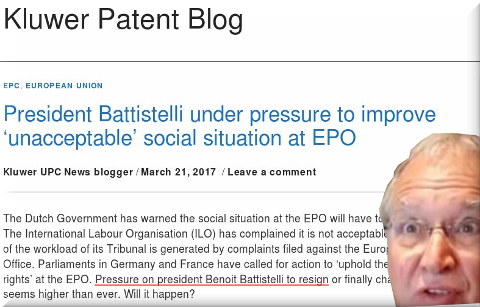

THE EPO was, for many consecutive decades, vastly superior to any other patent office, including the American one that's the de facto patent office across the world (because of the economic might of the US). The EPO was never the biggest patent office, but it was at least the best. That can no longer be said, as the Administrative Council was reckless enough to put a politician in charge -- a person whose disdain for science and paranoia go over a decade back. In turn, after a multi-year coup, the Administrative Council became subservient to this politician. Stakeholders hate him and recognise that he must go, but nobody seems capable of firing him anymore. He created and fortified a kingdom, which not even a bailiff is allowed to enter. He and his cronies pocket EPO budget and secretly/covertly build themselves luxury palaces with bars and baths at the top floor of a patent office! Guess who foots the bill. Is this a patent office or a sultanate? EPO staff certainly isn't tolerating it.
Kluwer Patent Blog has a long article detailing the situation at the European Patent Office:
President Battistelli under pressure to improve ‘unacceptable’ social situation at EPO
About the 40% increase in granted patents they asks:
"But is this really what the economy needs, as the EPO claims?"
Shameful hardly begins to describe the situation. A serious threat to the very foundations of patent law in Europe would be a more accurate description.
The EPO is there to uphold the law, as set out in the EPC. Now we know that, when it so desires, the EPO ignores provisions of the EPC that its management finds "inconvenient". We also know that the AC allows the EPO management to get away with this.
This all begs the question: which provisions of the EPC can we rely upon the EPO to properly enforce?
If rumours are to be believed, which rumours would certainly explain developments that I have personally witnessed, then Article 84 EPC will be the next "casualty". Also, the EPO's extraordinary decision to suspend examination of certain plant (product) patent applications suggests that even more fundamental provisions (including Article 113 EPC) could be under threat.
Not the most sustainable situation, really... and one that should be of grave concern to us all.
The Dutch Government has warned the social situation at the EPO will have to improve soon. The International Labour Organisation (ILO) has complained it is not acceptable that over half of the workload of its Tribunal is generated by complaints filed against the European Patent Office. Parliaments in Germany and France have called for action to ‘uphold the fundamental rights’ at the EPO. Pressure on president Benoit Battistelli to resign or finally change things seems higher than ever. Will it happen?
‘The Council had an exchange of views on the social situation at the Office and on the issue of the appointment procedure for the next President.’ Just one single phrase in the press release was dedicated to the ongoing social unrest at the EPO, after the 151th meeting of the EPO Administrative Council, 15 and 16 March 2017 in Munich.
It hardly reflects the mounting pressure that EPO president Benoit Battistelli has had to face over a wide range of issues that have led to a disastrous social climate at the EPO: the controversial introduction of a new career system and rules on sick leave, Battistelli’s failure to review staff investigation guidelines and disciplinary procedures, as had been requested by the supervisory Administrative Council (AC) in a Resolution of March 2016; conflicts with the Boards of Appeal over their judicial independence; failure to recognize the SUEPO trade union and the dismissal or demotion of several union leaders, among others.
[...]
But is this really what the economy needs, as the EPO claims? The German legal website JUVE recently published the results of a survey (English version here) among 186 technology companies worldwide, which revealed serious concerns about the functioning of the European Patent Office. 87 percent of the respondents said Battistelli is not doing a good job. Less than one third is happy with the reform of the Boards of Appeal. 54 percent wants Battistelli to step down and only 8 percent says he must stay. Also, there is growing concern about the effect of the EPO unrest on patent quality, according to the survey.
Still, Battistelli’s term as president ends in July 2018 and though he is under high pressure to improve the social situation at the EPO, it is not likely he will leave sooner than that. The appointment procedure for the next president, mentioned in the EPO press release was initiated and shortly discussed last week and the intention is to agree on a text for a vacancy notice in the next meeting in June, with the selection procedure for a successor possibly starting in October.